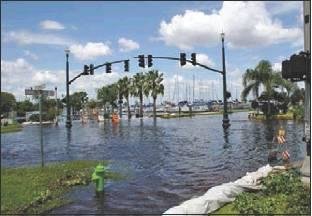Is your family prepared for hurricane season?
Do you have a plan in the case of severe weather?
Severe weather events, like hurricanes, are powerful and can come on quickly, often leaving a trail of destruction in their wake.
Because …
This item is available in full to subscribers.
Subscribe to continue reading. Already a subscriber? Sign in
Get 50% of all subscriptions for a limited time. Subscribe today.
Please log in to continueNeed an account?
|
Is your family prepared for hurricane season?
Do you have a plan in the case of severe weather?
Severe weather events, like hurricanes, are powerful and can come on quickly, often leaving a trail of destruction in their wake.
Because power outages are also common with strong storms and natural disasters, preparing your family ahead of time can help ensure safety.
Making a portable generator part of your plan ensures access to safe food storage and preparation, hot water, lights and important radio or television updates in the aftermath of a storm when it can be difficult to predict when full power will be restored.
Portable generators must be used properly to avoid potentially deadly carbon monoxide buildup, which is emitted as toxic engine exhaust and cannot be seen, smelled or tasted.
Although it is impossible to completely eliminate the hazards associated with improper generator use, models that comply with the American National Standards Institute (ANSI)/ Portable Generator Manufacturers’ Association (PGMA) G300 Standard provide enhanced safety through carbon monoxide sensors and shutdown features that can help protect your family.
Consider these tips for safe operation from PGMA:
• Keep the operator’s manual in a safe place so you can refer to it easily for further information about safe generator operation and potential hazards.
• To avoid dangerous carbon monoxide accumulation, always “Take It Outside.” Never run a portable generator indoors, such as in garages, basements, crawl spaces, breezeways, sheds or other partially enclosed spaces.
• Always place a portable generator downwind and point the engine exhaust away from occupied spaces. Avoid placing your generator near windows, doors or vents, as carbon monoxide gas can accumulate and potentially be drawn indoors.
• If you feel sick, dizzy or weak while using your portable generator, get to fresh air immediately and call 911 medical attention.
Other items that may interest you







Comments
No comments on this item Please log in to comment by clicking here